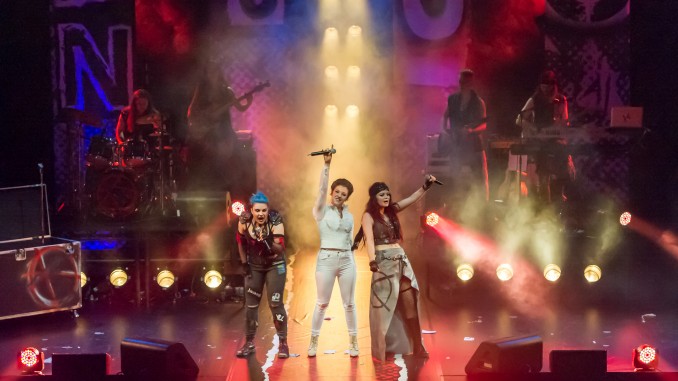
[Engaging with our Worlds]
The meme that gained exponential currency as 2016 trudged along was that 2016 was a terrible year. Aleppo, terror, celebrity deaths, Brexit, Harambe, and the coming of Trump – what started as a joke seems to have become a genuine expression of the globe having entirely written off this fucked up year. Yes, this contemporary perception is all relative (and aren’t we lucky to be able to fret about these things through our screens), but our ability to take the pulse of the globe, to send our missives of thoughts and emotions into cyberspace, seems increasingly intensified. But also, as the US election showed the world, increasingly polarised. We become stuck in our own feedback loop, Facebook and Twitter curations feeding back what we already know to be true. We are connected like never before, but only in our own spheres of algorithmic influence.
Sometimes theatre can seem quite disconnected to all that is trending in our social media bubbles. This can be good, escapism and social company can be just the ticket. It’s also one of the few bastions where our total attention is still demanded. And this a great thing.
Mostly, our theatre audiences are self-selected. They too go to shows that will confirm their biases and world view.
But sometimes, theatre can seem quite connected to all that is going on in the world. It can give insights and empathy to our personal and emotional worlds, and the world at large. Sometimes, we give our attention, and it can shock us, send us into a whirl. Like the friend who phoned me late at night, needing to talk about White/Other.
The biggest story in world theatre this year was when the diverse cast of the revolutionary American musical Hamilton addressed Vice-President elect Mike Pence, and asked that his administration govern for all of America. Trump, a one-time failed Broadway investor, went on a twitter meltdown about the rudeness of the cast of the “highly overrated” musical. Broadway’s Richard Rodgers Theatre was the Theatre Dionysus, speaking truth to power like the Ancient Athenians.
While Hamilton had been embraced by Clinton and the Obamas as fundraising vehicles, Republicans Paul Ryan and George W Bush both appeared in a documentary about the show, and Pence himself, who took his daughter, enjoyed the show.
Sometimes theatre can get us in the same room. Shakespeare’s Globe famously catered for the rich and the groundlings. We got to see this in action in Auckland this year with the Pop-up Globe, where the groundlings, having paid their $15 to stand in front of the stage, could look up at the Lord’s boxes and smirk at their awful sight-lines.
So, on the local level, how did we do in 2016? April began with the instruction from Creative New Zealand Chairman Stephen Wrainwright to buy a lotto ticket if we wanted to support the arts, and organisations were warned to receive “up to 10% less financial support from Creative New Zealand” in the coming year and beyond”. I wrote that “The arts should not be at the mercy of the rise and fall of the lotto numbers”. So far, theatre in Auckland has proved a place of resilient activity, with practitioners everywhere doing more with less.
2016 has been a very good year to be a theatre-goer in Auckland. It has has been a place to retreat from, but more often than not, engage with the world.
SUMMER OF THEATRE
Each summer Auckland’s theatre calendar gets busier and busier. While it was not a Fringe year, it was up to the Pride Festival to serve us our fix of ‘alternative’ theatre (Heteroperformative and Puzzy being standouts). The Pop-up Globe arrived like an inflamed pimple on Auckland theatre’s face, threatening to take attention away from all its other great features, and the Auckland Arts Festival continued boldly on, delivering a worthy program.
At the Festival I loved Te Pō by Carl Bland, which riffed on the plays of Bruce Mason through an absurdist mystery, and wrote a primer on the play for The Pantograph Punch. Marama sought to draw attention to the scourge of deforestation in the Pacific, and Not in our Neighbourhood by Jamie McCaskil was also theatre with a purpose. As Nathan Joe wrote:
Not in our Neighbourhood wants to tell us that domestic violence against women happens all around us, not limited to class, age and racial binaries. As a tool for social awareness, it more than gets the job done. It’s moving, informative and impeccably performed. No one coming out of this play will find the content easy to sweep under the rug. And while it hasn’t quite balanced its artistry with its aims for advocation, it carries an important message that needs to be heard.
Of the international visitors, The Chorus; Oedipus from Korea “made me hunger for more New Zealand work to engage in both classical and contemporary stories in this way. For a physical, sports-mad nation, the lyricism of the body is all too rarely unleashed on the theatre stage, though we see it all the time in our dancers. Like The Chorus, a physical theatre Opera, we should explore more cross-over in forms.” The James Plays had me an Matt Baker binge on 9 hours of theatre and record a podcast of the experience. In my reflection of the Arts Festival I wrote that these plays, produced by the National Theatre of Scotland, had a lesson for us in New Zealand:
It is surprising to learn that the company is only ten years into its existence. With a population only slightly above ours, their confidence and quality invites day-dreams about what sort of stories a National Theatre of Aotearoa could be empowered to tell, both for ourselves and the globe.
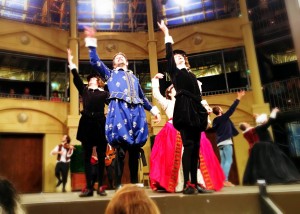
Speaking of globes… Over summer the Pop-up Globe scaffolding had been stubbornly inching higher and higher in the Greys Ave carpark. Depending on who you spoke to, this was to be the greatest theatrical event to ever hit Auckland, or a colonial cradle of doom, blocking out The Basement’s sun and choking the life out of our indigenous theatre. In the end, it was a financial smash hit, but artistically, it was a globe of mediocrity.
The Pop-up Globe company gave us Twelfth Night and Romeo and Juliet, which ran throughout an unprecedented three-month season. Neither were great examples of Shakespeare, and they both played it safe. The all-male Twelfth Night had little to say about the play itself, and were content to borrow off Mark Rylance’s London Globe/Broadway production of the same play. Romeo and Juliet couldn’t find the tragedy, and Matt Baker labelled it a “production of insultingly facetious sentiment”.
Still, I enjoyed being a groundling, especially the night I came to Twelfth Night wearing a rain jacket:
The rain it raineth hard that night. And there I was in the groundling pit, wet as heck, but right up there by the stage. You couldn’t match the atmosphere and goodwill between the actors and audience. Hand on heart, this was one of my favourite Shakespearean experiences of my life.
In my reflection on the Pop-up Globe, I picked up one of its most controversial elements – the anachronism of the all-male cast, which was thrown into further relief by some of the guest companies also appearing on the Pop-up stage:
So why do we need the all-male production? I acknowledge that it is fashionable to do Twelfth Night this way…. In this version we have a brilliant Maria (Stephen Butterworth), and an irresistible Olivia (Daniel Watterson), but this is countered with a forgettable Viola, a character who should be anything but.
It does not mean that we shouldn’t have Butterworth and Watterson in these roles, but you should also match this with some other gender inversions. Much Adoe’s commentary was heightened through its gender swapping, and Benjamin Henson’s The Tempest has taken another approach with gender-blind casting (with acclaimed actor Lisa Harrow as Prospero). The all-male casting of Twelfth Night is old-fashioned, and not in the way you want it. Ironically, the greatest argument against this choice is the all-female Henry V, which was spearheaded by local practitioners as a direct response to Twelfth Night’s casting call. Why wouldn’t you want some of these amazing actors in your cast?
Like the Shakespearean addict that I am, I went to all the plays. Henry V. Antony and Cleopatra. Hamlet. In the end, Benjamin Henson salvaged the Globe season for me. The cross-gender cast The Tempest had the full force of a director’s vision behind it (Ferdinand and co wash up on a bay of pigs), and Titus (yes, all-male), which I’d first seen when it was a third year Unitec production, took the Globe hostage and declared: this is how you make Shakespeare come alive.
In the end though, the best Shakespeare I saw all year was not at the Globe at all, but at the Mangere Arts Centre with the Blackfriar’s production of Macbeth. Set in a pan-polynesian Hawaiki, with ritual, song, genuinely disturbing young witches, and an epic battle scene, the Pacific lens made so much sense of the Scottish play.
THOSE BLOODY WOMEN
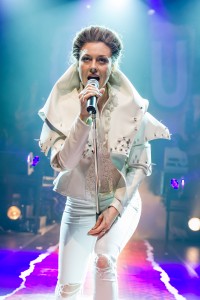
I wish our new Prime Minister had seen That Bloody Woman. He might have had a different response when he was asked if he was a feminist. During the show our crusading suffragette Kate Sheppard (Esther Stephens) asks us to raise our hands if we agree with some non-controversial statements (things like, you know, equality between genders) and then delightedly declares to a sea of hands: you’re a feminist! If going to Victoria University hadn’t prepared Bill with the knowledge of what a feminist is, That Bloody Woman certainly would have.
The show had me making hubristic comparisons with Hamilton (my favourite show that I’ve never seen), which won the Tony for Best Musical the same day my review was published:
What other hit musicals are waiting to be discovered on $10 notes? Hamilton is all New York’s been talking about, Lin-Manuel Miranda’s musical rescued their founding father from obscurity, ensuring his portrait will remain on the $10 bill. Our Kate’s in no risk of going anywhere, and looking good on the shiny new redesign, but how often do we talk about her?
As Hamilton did for the US constitution, That Bloody Woman makes the arcane political world of suffrage and upper houses of parliament relevant, even edgy. Both shows use historical facts to speak insightfully about our contemporary situation. Both Kate and Hamilton are immigrants: they get the job done. Hamilton’s rap soundtrack is required listening. TBW’s go-to is punk and glam rock, and I need these songs in my life too.
That’s about as far as I can work my ten-dollar founding mother comparison (Hamilton’s cast is famously diverse, TBW’s is… rather Christchurch), but in a meagre canon of New Zealand musicals (Once Were Warriors the Musical, anyone?), TBW could be just as significant to us as Hamilton is to the US.
Hillary Clinton quoted Hamilton in her speech at the Democratic National Convention. That Bloody Woman got its local equivalent when Winston Peters invoked That Bloody Woman in a speech:
Christchurch is known as being the home of the woman on the New Zealand ten dollar note, Kate Sheppard.
You might have seen the show on her recently at The Court Theatre – “That Bloody Woman!”
Kate Sheppard fought hard so that women would have the right to vote.
She did not take this responsibility lightly – she saw how important it was and she valued it.
Out of all of our politicians it was Winston Peters who got behind the show and Kate’s legacy. Winston – Bloody – Peters. Bill English, you need to get with the program fast.
My wish to have the songs in my life came true, and after a crowdfunding campaign That Bloody Woman released an album (available now on Spotify and iTunes). Listening again, I’m struck at just how irreverently Kiwi it is in sound and attitude (you can tell two men wrote it, Luke Di Somma and Gregory Cooper working as many dick jokes that they can in ‘Tricky Dicky’, Richard Seddon’s showstopper).
That Bloody Woman’s achievement is giving us a story we can tell about ourselves. The prim $10 note Kate is given 3D life as a hard-rocker, and we can share in the national pride of what the New Zealand suffragette movement achieved. But part of the show’s premise is Kate coming back and not being happy with where New Zealand currently is at either. It uses the story of what they did then to ask, what will you do now?
Sheppard’s challenge for us is to consider which of the prevailing ideologies today people in a hundred years will find perverse. We’ve all dined out on New Zealand being the first country to give women the vote, but when a woman gets $8.60 for every Kate Sheppard a man gets, we can understand why Kate wants her legacy to count for more.
That Bloody Woman continues to tour in 2017. Can we set up a special performance at parliament? Tickets for Bill and Paula are on me.
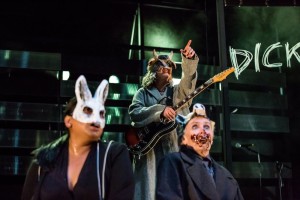
At the time of my review Clinton was riding high in the US polls, our Helen was looking like a contender to head the UN, and fourth-wave feminism was in ascendance. America’s new Pussy-Grabber in Chief is unlikely to have dealt the movement a death blow, but the task has become that much harder. Silo’s Boys Will be Boys was one of the most prophetic programming this year. When I wrote my review it was bad enough:
Boys will be Boys has been programmed by director Sophie Roberts with some pretty spooky prescience. The mirror it holds up reflects back a whole lot of nasty images out there in society. Steve Tew could come make notes on team culture and collective responsibility. Someone should buy a ticket for Kevin Roberts. Where ATC’s Kate Sheppard Musical That Bloody Woman gave us a comforting rah-rah girl power message, Silo’s Boys Will be Boys is the cynical market correction. Its exposure of gender double-standards and a rape culture workplace is unflinching and uncompromising. It treats empowerment as an ultimately empty word. It’s unafraid to embrace bad feminism, to take a pessimistic, hopeless view of where the feminist waves have washed up today. It’s the most ballsy show you’re likely to see in a mainstream theatre all year.
No doubt the female protagonist, Astrid (Amanda Billing) would have voted for Trump if she could. But there was hope behind-the-scenes. Silo Theatre’s 2016 was remarkable for the fact that all of their shows were directed by women – and won’t it be great when reading such a fact will no longer be remarkable.
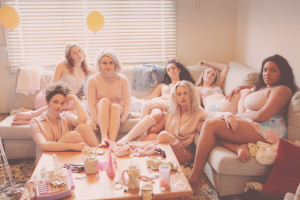
Gender was one of the most important conversations Auckland theatre had this year, such as in the return season of Julia Croft’s If There’s Not Dancing at the Revolution, I’m not Coming, The Offensive Nipple Show from Theatre Scenes’ own Jess Holly Bates, or FLAPS, which Rachael Longshaw-Park said fulfilled its promise to present “hidden conversations between women leaving audiences entertained and hopefully a little more informed in the ways of living with a vagina”. In FLAPS we were invited into their slumber party, we sat on pillows, bangers were blasting on the speakers, and I was even allowed to play on one of the actor’s Tinder (I’m sorry for those matches). Through the night they cheekily confessed their secret thoughts, owned everything, and slowly removed the accumulation of shame. Empowering? Hell yes.
While shows interrogated the performance of female and non-binary genders, what was less apparent, save for Boys will be Boys, was an attempt to place a searing lens on masculinities. On the one hand, masculinities are everywhere in the stories that are told and the parade of male protagonists, but it is naturalised by its very pervasiveness. But masculinity too is calling out for more deconstruction by the men themselves.
The exception was The White Guitar, the story of the Luafutu family’s life told by father John, and his two sons (Matthias and Malo, aka Scribe). I came out of this one reeling – what so raw and powerful about The White Guitar was that each night John would sit there and atone in front of his boys for the mistakes he had made in his life that had affected them. It was about redemption, the quest to become better men.
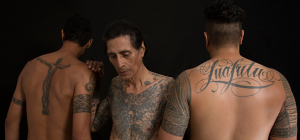
Sharu Delilkan and Tim Booth wrote:
The White Guitar is not just the story of the Malo Luafutu aka Scribe’s rags to semi-riches experience but a brutal and honest catalogue of the effects of immigration, violence, drugs, family, religion, decline and redemption for generations of a family struggling to survive and more importantly, to find a voice despite the curve balls that life throws them.
What could have been a formulaic, well-worn story is so much more realistic and gut wrenching because of the rawness and real treatment that The White Guitar delivers in spades. In fact we’d go so far as to say that it is one of the most soul-bearing pieces of theatre we’ve seen in a long long time.
THE BIG TWO
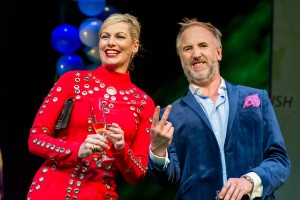
Auckland Theatre Company stumbled through the first shows of their season, but scored a home run with its final productions. You Can Always Hand Them Back by Roger Hall was the definition of unchallenging for its self-selected audience, who have grown old with Roger Hall. Nathan Joe said that “rather than reflecting or questioning the way we are, Auckland Theatre Company have projected an idealised and comforting version of the audience onto the stage”. That was a lesser Roger Hall, and Polo was a lesser Dean Parker failing miserably to be Roger Hall. I asked what a good leftie playwright like Dean Parker was doing writing a play that looks like a fluffy summer comedy set in a Clevedon polo club?
ATC even released a spoof video featuring society royalty Colin Mathura-Jeffree spanking actor Harry McNaughton with a riding crop while eating oysters. This could have all been leading up to a bait and switch, luring us in only to eviscerate the rich and powerful, but Polo ends up as more of a sell-out than satire.
I thought the SkyCity theatre venue, replacing the Maidment, was very appropriate. Matt Baker said the play was like a “mallet to the face”:
the entire script comes across as nothing more than a mean-spirited attack on the very people laughing in the audience. Racist jokes are met with howls of laughter, not because they expose the true nature of such despicable people, but because those responding to them tell those very jokes themselves. Polo offers no insight, revelation, or even genuine commentary on the upper class… If geography really is destiny, stay away from the SkyCity Theatre.
ATC followed with two stage adaptations of popular novels: To Kill a Mockingbird and The Curious Incident of a Dog in the Night-time. Mockingbird’s programming was inevitable resonant. I noted:
As a starting point, how about the #BlackLivesMatter campaign, and the appearance of the mothers of Mike Brown and Trayvon Martin holding photographs to honour their deceased sons in Beyonce’s LEMONADE, as a window into the social and institutional racism festering in the dying days of Obama’s America?
The programming was timely, it was just a shame that the adaptation was so unengaging. I said it was like a sparknotes version of Harper Lee’s classic, and I hoped that it wouldn’t put people off reading the actual novel (a suggestion that saw my mother finally read Harper Lee’s classic, possibly the best outcome any of my reviews have ever achieved). Curious Incident however was a clever meta-theatrical adaptation of the novel (though Matt Baker disagreed), one that the company didn’t quite achieve. I said:
Like the National Theatre version, ATC have gone full tech with the AV design, but unlike the NT version, it comes off like a damp squib, washed out by the lights… Ditch the AV effects. Give the ensemble even more to do. Fully embrace the logic of a company of actors without West End pounds putting on this play.
Venus in Fur‘s intellectual erotic meanwhile got me all hot and bothered:
Venus in Fur questions how we should engage with texts deemed ‘problematic’ by today’s eyes, the gender double standards of the roles written for male and female actors, the various shades of sexual fantasies that have currency in contemporary society, and what all this might say about us voyeurs watching from the stalls.
And then, all eyes were on Billy Elliot, and their final production of the year. Auckland Theatre Company opened their incredible waterfront theatre just in time for the news that one of their previous homes, the Maidment Theatre, was to be demolished.
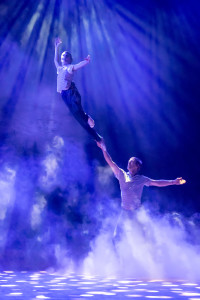
Billy was Auckland Theatre Company’s triumph. Having seen the musical in Sydney and London, I could say with confidence that it absolutely competed. It did get me wondering about its values though:
While the musical has a brilliant song putting the boot into Maggie Thatcher, politically its values are incoherent. It wants to honour the miners, nobly fighting a lost battle, but for Billy’s story to work they also need to be contrasted as backward boorish relics. Billy is advised to go and never look back. There’s a tension running through the lyrics between the working class refrains of “all for one, and one for all, solidarity forever” and the final curtain-call message “what we need is in-di-vid-u-a-li-ty”. Yes, Billy Elliot smashed the union movement, dancing off to his neo-liberal future.
Silo brought back The Book of Everything, with some key cast changes (including Amanda Billing and Stephen Lovatt), which made this fantastic play even more emotionally affecting. They also produced the return season of Chris Parker’s No More Dancing in the Good Room, which he remarkably completed with a foot injury (he was in a moonboot when he wasn’t onstage). Medea was another fascinating choice from Artistic Director Sophie Roberts. I wrote:
In updating Medea, one question is how the monstrous mother sits in our contemporary landscape. There have been many Medea’s, in recent history as in myth, and we return to this story to grapple with the how’s and why’s of this transgression.
By focussing on the boys, the adapters effectively side-step this issue. While her cheeks might be stained with tears and mascara, Bronwyn Bradley fixes her mother’s mask on every time she enters the boy’s room: never let on the pain you are feeling. Our knowledge is as limited as children’s are of their own parent’s larger emotional lives. We are simply shown the actions of the story – the task of explaining her psychology and off-stage context is left to the audience. We are an analyst with scant clues and only a mythical case history to fall back on.
As with Boys will be Boys, Sophie Roberts once again demonstrated her spooky nous for timely programming decisions with Perplex, whose absurdism matched the Trumpian post-truth alternative reality that he had all suddenly arrived in. Nathan Joe said:
The slipperiness of identities and the ever-changing narrative is the clearest theme of the play, and results in an appropriate allegory for our times. The message is clear: nothing is constant and any attempt to find meaning is precarious at best.
DEVELOPMENT BLUES REDUX
In my review of 2015 I fretted about the way we were preparing new work for the stage, and how often they were being set up to fail. This year, Indian Ink’s The Elephant Thief was a salient example of when, even with plenty of development time (the company spend two years per show on average), there are still things you can only discover and test when you’re in front of an audience, and you can still end up with a white elephant.
Matt Baker concluded his review:
Indian Ink has cultivated an admirable attitude towards truly developing their craft, an attitude from which many other companies and practitioners could learn. In a country so young, their theatrical voice is unique, and potentially the most authentically Kiwi to emerge from the melting pot of our Asian, Pasifika, indigenous, and colonial heritage. While this time they may not have found a cohesive flow between story and message, The Elephant Thief truly contributes to the debate of what is New Zealand theatre.
With twenty years experience, Indian Ink are in a good place to retool and improve, but what of our younger companies? Proudly Asian Theatre had a high-profile slot at the Herald Theatre for Call of the Sparrows by Chye-Ling Huang. The epic scope and ideas were exciting, but the whole project felt rushed to production, and they needed to rethink many of the story elements (a high-stakes gambling game used in the show had no stakes for us because it wasn’t a very interesting way to reveal character, and we knew the protagonist was likely to win). It felt to little too late to suddenly emphasise it was a “development season” when we arrived at the show, counter to how it was marketed. It’s a play I would dearly love to see come back stronger, but after The Herald, where do you go next?
Nathan Joe found the play’s lack of identity politics an encouraging step:
This is a company whose values aspire to reflect an entire cultural movement happening all around us, of our stories slowly beginning to reflect our communities. While some will find the play’s lack of content dealing directly with Asian identity politics to be a missed opportunity, any work by Asian artists questions the notions of Asian-ness and tokenism by sheer virtue of existence. The very act of populating a major theatre venue with Asian actors led by Asian theatremakers is revolutionary. Even if it shouldn’t be.
I was also disappointed by Q Matchbox’s season of Leilani. It should have resonated with Auckland’s shameful winter of homelessness, but was stuck in a cross between commedia dell’Arte and Shortland Street. Jess Holly Bates however welcomed their mask work:
We are seldom treated to theatre in New Zealand that works in mask. Here the form is dominated by Indian Ink Theatre Company, and they rarely set their work in a New Zealand context. It is a brave act by Mahuika, not only in terms of form, but also the translation of a seventeenth century theatric practice to a localised context – we see the ‘straight up kiwi bloke, the Maori trickster, the Samoan sweetheart.’ This is an exciting addition to our lexicon.
The Beautiful Ones from Tawata Productions was another that did not sing the way it could, and Nathan Joe thought it was an unfinished product:
Though The Beautiful Ones crafts a strong creative vision with minimal text, it’s hard not to imagine stronger narrative threads serving the world and the characters better. Doing so could lift a fun night out into a truly moving one.
I write with hope with what these shows could be, but I fear the industry still needs to more to ensure the best chances for development and success.
THE WEEKLY BASEMENT VISIT
If you’re not regularly going to The Basement, you’re not doing Auckland theatre right. They’ve even made it easy for us, standardising times upstairs and downstairs to make it easy (and affordable) to see two shows per night. Once again, The Basement was where you could take the pulse of Auckland’s creative scene and find some truly innovative work. Where else could you find a promenade Opera (Dido and Aeneas), an absurdist European drama (Close City), obscure Tennessee Williams short plays (Tennessee Retro) or be taken to plant potatoes in Myers Park (Potato Stamp Megalomaniac). Jess Sayer returned to skewer family dynamics in Sham. Nisha Madhan and Stephen Bain gave us free money to spend in Free Happiness, and then begged us to give it back. In the process, they opened up their accounts to show just how precarious financially making a show, even at The Basement, can be. You don’t do this for the money.
White/Other by Alice Canton was a polarising work not just in its title, sparking some of the most interesting conversations of the year. Nathan Joe wrote:
The relationship between artist and audience is a constant negotiation, and especially delicate when dealing with race. How do you challenge without offending or educate without condescending? Alice handles this well, never resorting to cheap laughs or uncomfortable audience participation, but there’s also rarely any real sense of threat or surprise. The result feels overly cautious and diplomatic at times.
Casually delivered to us, mostly as offhand remarks or sudden thoughts, Alice’s observations are all well-observed and, at their best, powerfully succinct. The problem is these observations only make up a short portion of the tight 60-minute show, barely skimming the surface of the Chinese-Kiwi experience. The inherently didactic material is made palatable, but perhaps too palatable. This is especially apparent when the show touches on potentially contentious topics such as orientalism, fetishisation, bi-racial identity and micro-aggressions only to leave them unexplored. The focus subsequently becomes more about its mechanics and stylistic ambitions rather than thematic concerns, where content seems to be at the mercy of the form.
Hayley Sproull’s Vanilla Miraka was another that tackled cultural in-betweenness, which Nathan Joe welcomed as an “addition to the ongoing conversations on our stages about who we are as people, as individuals and as a nation”:
Vanilla Marika is at the best when it feels personal, when the jokes and anecdotes relate directly to Hayley’s real circumstances and real anxieties. The moments when she pokes fun at Maori culture outside of herself tend to feel too easy and unconsidered. At worst, impersonal and apolitical. While Hayley doesn’t presume to speak on behalf of anyone else, her situation is highly relatable and relevant to New Zealand’s cultural consciousness. Have we not all experienced inadequacy, guilt and confusion over our collective identity? The show doesn’t provide any easy answers, but it asks the right questions.
The Basement was dominated by the solo show format, including Miss Jean Batten, Banging Cymbal, Clanging Gong (mostly solo), The Voice in my Head and Mockingbird. Rob Moraka’s Shot Bro took the confessional possibilities of the form to an affecting raw place, sharing his experiences of mental illness. While the show was theatrically inventive and compelling in its honesty, what was even more remarkable was what happened afterwards. Kai was shared and a space was created to ask Rob and his director questions, and acknowledge the charged experience that performer and audience had gone through together. This, above all, underlined the power of when we do all get in the same room.
Last Tapes Theatre company are the MVP’s of 2016, shepherding three new works for The Basement this year. As Matt Baker put it, “between independent producers and production companies presenting their own works, whether old or new, there are few of either who dedicate themselves to introducing new playwrights, actors, designers, and directors to Auckland audiences. Enter Last Tapes: First Steps season, which is “dedicated to supporting and staging debut work of emerging artists in our community.”

While Defending the JJ Mac was undercooked, Oliver Page’s Mating in Captivity was a playwrighting debut to be envied. Every so often someone says they’re going to reinvent the screwball comedy form and you react with skepticism, but Page’s successfully uses the classic repartee to expose the millenial gap in how they view themselves (articulate, unstoppable), and how they really behave. Their final work, Valerie, was intensely personal. The dramatic and personal stakes were high for creators Robin Kelly and Cherie Moore, as they grappled with the extent that Kelly’s family and genetic history shaped the destiny for their own relationship. Rachael Longshaw-Park found a lot of resonance:
With Mental Health Awareness week just around the corner, Kelly’s story reminds us of the importance of understanding mental health and its effect on ourselves and the world around us. New Zealand is still highly ranked amongst world countries for our rate of suicide and in recent surveys it was discovered that mental disorders are the third-leading cause of health loss for New Zealanders at 11.1%, behind only cancers (17.5%) and vascular and blood disorders (17.5%). However, every day those 11.1% are continually given misinformation, rarely taken seriously and are even discriminated against in the workplace. As an unseen illness mental health is often disregarded as a serious and legitimate concern. Kelly’s story reiterates that long before we had a handle on the depth and breadth of the situation, mental illness took root in families, destroying them from the inside and out.
Last Tapes also produced Vernon God Little for the Actors Program, another timely show which fitted the new mood of American anxiety all too well, and so good I forgot it was by a graduating class of actors.
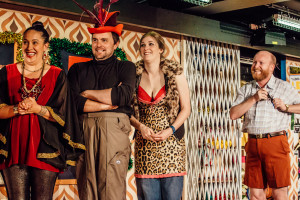
In terms of retreating from the world, The Basement gave us some standout comedy. Tim George called Milky Bits “one of the most scatterbrained messes I’ve ever seen. And I loved every stupid second of it.” Christ Parker, Thomas Sainsbury, Kura Forrester and Brynley Stent gave us Camping, the funniest and naughtiest show of the year, and then followed it up with The Opening Night Before Christmas, their love letter to amateur dramatic, and a great excuse to see a celebrity guest be made to appear in some ridiculous scenes. Tim George concluded his review that “ultimately, this is Kura Forrester’s show. She was the standout of the last Parker-Sainsbury joint, and she gobbles this one up with equal aplomb.”
EVEN MORE
- Matariki is increasingly being recognised on Auckland’s theatrical calendar. The Basement held a Matariki festival (including the return of La Vie Dans Une Marionette), and Auckland Live hosted their first play in Te Reo, Briar Grace Smith’s Purapurawhetū.
- The Basement ditched Young & Hungry, but Auckland Theatre Company returned to The Basement one last time with their Next Big Thing Festival. Shoulda, Woulda, Coulda was the urgent cry against apathy, asking what the young cast would fight for.
- Don Juan at Q was charming and funny, but for a play all about a legendary figure of seduction, it stood out for not more fully interrogating gendered assumptions of courtship.
- The Wholehearted was a return to form for Massive Company.
- The 400 year anniversary of Shakespeare’s death was marked in other ways than just the Pop-up Globe. Thomus by Ash Jones was an experiment in writing a contemporary play in iambic pentameter, Nathan Joe said that in the end result was “every line is a protest against naturalism and subtext, a gloomy celebration of excess”. In Lucrece Auckland Shakespeare Company theatricalised one of Shakespeare’s poems to have a conversation about rape culture. Rachael Longshaw-Park said “it’s encouraging to see other companies also take on the responsibility of handling such sensitive concepts and issues instead of resting on easy entertainment. Hopefully this encourages more people to use theatre as a social and political tool to create and sustain important conversations.”
- The Blue Man Group arrived to challenge the supremacy of white male narratives (not really).
- Ditching conventional venues, and accommodating only 6 audience members per show, Car drove us on a magical mystery tour of Auckland city.
- At the Comedy Festival, I was terrified of the life-changing potential of Red Bastard, and An Hour with Ackbar showed my favourite Star Wars Mon Calamarian could me more than an internet meme.
- On the Musicals front, I got a lot of heat for my pan of Phantom of the Opera, telling fans to lower their expectations. Priscilla Queen of the Desert remains one of my favourites, but I wish they’d worked harder to cast the aboriginal character Jimmy. Flashdance was flash-in-the-pan (I really did forget that I saw this). Sweeney Todd made me hunger for more Sondheim musicals to be given the NZ Opera treatment. At the other end of the scale, Rebel Theatre put a stake in the ground that Musical theatre doesn’t always need big spectacle with their production of song-cylcle Edges.
- And I had a good-natured spat with Sam Brooks about the state of New Zealand criticism past and present.
Overall, 2016 has been an outstanding year for Auckland theatre, with many productions willing to dive head first into the most important conversations of our worlds.
I’ll leave you with one of the most special moments I experienced this year, to again reinforce my thesis.
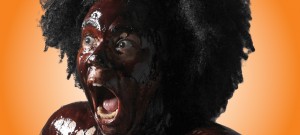
It was at the Auckland Art Festival’s Tar Baby by Desiree Burch, where I found myself playing the role of race relations commissioner and sex object. From my reflections on the Festival:
At the end of the show I’d been singled out and called up again. I’m her type: tall, geeky, white. She sets up a sign behind me that reads “kissing booth”. I knew what was coming…
Tar Baby is described as an “interactive carnival of race and capitalism”. Burch acknowledges that it’s a show in which she can commodify and make a spectacle of her blackness, and audiences can go away feeling liberally worthy. That is part of the transaction. But within it Burch can also explode atomic truth bombs, calling out privilege and unspoken assumptions, particularly around the quagmire of the American experience, but also in our South Pacific nation. There’s comedy, and rage, and a laugh can quickly choke into a gasp. I lurch between elation and seat squirming.
And now at the end, I’m called to kiss and make up. She asks if she can touch my courage, and puts her hand on my chest. She invites me to dance, and sings to me. She says some awfully nice things. When she offers her lips, how can I refuse?
This was all profoundly moving for me. You might be thinking, here’s the white guy making it all about himself as usual. And I’m going to risk another stereotype – the unloved critic. I haven’t pursued anything romantically for a while, and I suppose I don’t feel attractive all that often, but I did that night. Yes, this is a gag, and an essential part of the show’s structure, but I felt validated. Burch was asking for this too. She wanted someone to look into her eyes. It was a beautiful moment. I beamed.
The political made intensely personal. One of the most affecting moments in the theatre for me this year, and still my only kiss. 2016 eh?
SEE ALSO:
– Sam Brooks for The Pantograph Punch: Violently to my Taste: Ten Moments in Auckland Theatre 2016
– NZ Herald: Curtain Falls on 2016 Theatre
– Jonty Crane: Best of 2016 – Auckland Theatre and Dance
Theatre Scenes Year in Reviews: 2015 ; 2014 ; 2013 ; 2012 ; 2011 ; 2010

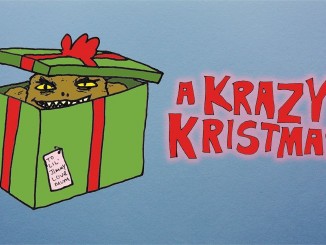
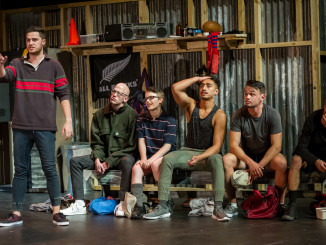
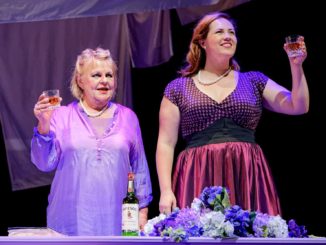
Having endured a lifetime with a name that is constantly mispronounced and misspelt, I’m probably a bit oversensitive to the issue of journalists and critics getting names correct! But in that vein, nevertheless: Rob’s surname is Mokaraka, not Moraka.
(I may also perhaps be out of touch with the latest in trendiness, but as far as I’m concerned the Americans have far too much dominance over our politics, economics, and culture already – so that personally I prefer that we do not adopt Americanisms in our writing – such as ‘program’ instead of ‘programme’!)
Great to read such a comprehensive overview of Auckland’s theatre year though – good stuff!